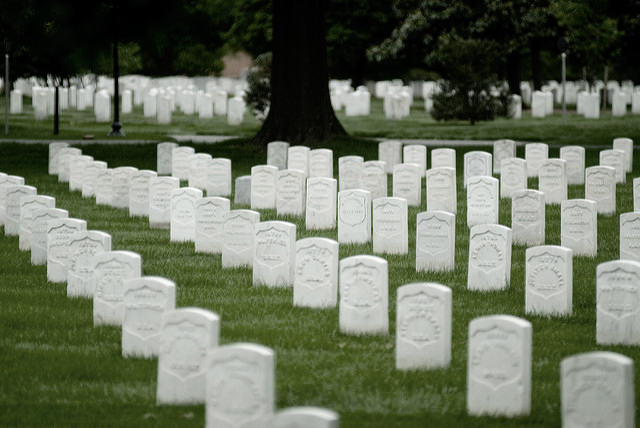
My father was laid to rest in the hard February ground this year. He could have been buried at Arlington National Cemetery, but was instead brought home to north Alabama to meet whatever eternity has to offer him. Among the worldly possessions he left behind were a Bronze Star, a rifle given to him as a gift half a world away, a tri-cornered folded American flag, and me. He was given full military honors at his service. You see, once upon a time, my father was a soldier.
He went to Vietnam in 1970 and achieved the rank of captain. He was awarded the Bronze Star for leading an operation that saved thousands of civilian lives. He came by the ChiCom rifle — a beast of a thing, 20 pounds heavy at least, all wood and bright steel — by way of an ARVN friend who found it in a weapons cache. It didn’t work — you’d do better breaking eggs with the buttstock than trying to shoot anything with it — but he kept it to remind himself that it all actually happened, and to remind him of his friend who he never saw again.
The rifle is a story in itself. It was a relic of the French war in Vietnam, the one we failed to learn from. When my father got the call to the “freedom bird” in 1970, he barely had time to pack his duffel and grab the rifle his friend had gifted him. He stepped off the plane to greet my mother at Dulles in his field greens, with the muddy tan and the mustache and the dirt of the war still stuck in the waffle of his boot. When they got to the baggage conveyor, down came the rifle, unboxed, the hard truth of the war right there in broad daylight.
People in the room recoiled; after everything that had happened, so many still refused to face what it is soldiers do, what they are tasked to do and what is done to them. Their faces betrayed them. They wanted no reminders of the war many of them had voted to sustain. My father put the rifle to right shoulder arms, took my mother’s hand, and walked out of the airport into the bright light of being finished with war. I was born nine months and 27 minutes later.
Two decades passed, and my father and I were on some anonymous highway driving through a punishing late-summer Alabama downpour when “Riders on the Storm” by The Doors came on the radio, and his knuckles went white on the wheel. His face bleached of color and his eyes changed in a way I’d never seen. Slowly, quietly, through gritted teeth, he told me about being on board an Air Cav gunship above the Mekong Delta and seeing a storm far out to sea. The clouds were firing lightning bolts into the ocean, and all the while, “Riders on the Storm” was playing on a rig they had in the chopper. It was the one time, the only time, he ever spoke to me about the war.
The Vietnam War damaged my father, but quietly. One would never know it to look at him or speak to him, but there was a limping desolation to the man that never entirely went away after the war tan faded and the muddy boots were put in storage. He did heal, but he was never whole. He made a life for himself as a lawyer in public service wearing a small Bronze Star pin in his lapel, right where the hypocrites who never knew combat put their flag pins.
Veterans Day is for the living. Memorial Day is for the dead. As my father has left us, I felt it meet to tell his story. The simple fact of the matter is that he served as just another green helmet in a war that lasted 25 years, and the truth of that service left a bruise on his heart which never healed. That war killed millions. Today, we are entombed in two wars, one of which has likewise lasted 25 years and has also killed millions. I know what war did to my father a generation ago. I can only imagine what these wars have done to the men and women who stepped into the ranks when men like my father turned left face and marched home.
A final thought on this day. You could fill 10 libraries with the books and films describing the Vietnam War, the Iraq War, World War II, describing war itself. One of these days, someone needs to write a book about what war does to the children of those who are sent to fight them and die in them. Maybe I will someday. In a number of ways, my father died in Vietnam. He just didn’t know it. That war defined his life, and defined my life before I was even born. There are many like me, and many more to come. We are the children of aftermath.
You see, once upon a time, my father was a soldier.
For my father. Rest easy, Pop. I love you.
Before Midnight: Last Chance to Have Your Gift Matched!
Before midnight tonight, all donations to Truthout will be matched dollar for dollar up to $11,000! Thanks to a generous supporter, your one-time gift today will be matched immediately. As well, your monthly donation will be matched for the whole first year, doubling your impact.
We have just a few hours left to raise $11,000 and receive the full match.
This matching gift comes at a critical time. As Trump attempts to silence dissenting voices and oppositional nonprofits, reader support is our best defense against the right-wing agenda.
Help Truthout confront Trump’s fascism in 2026, and have your donation matched now!